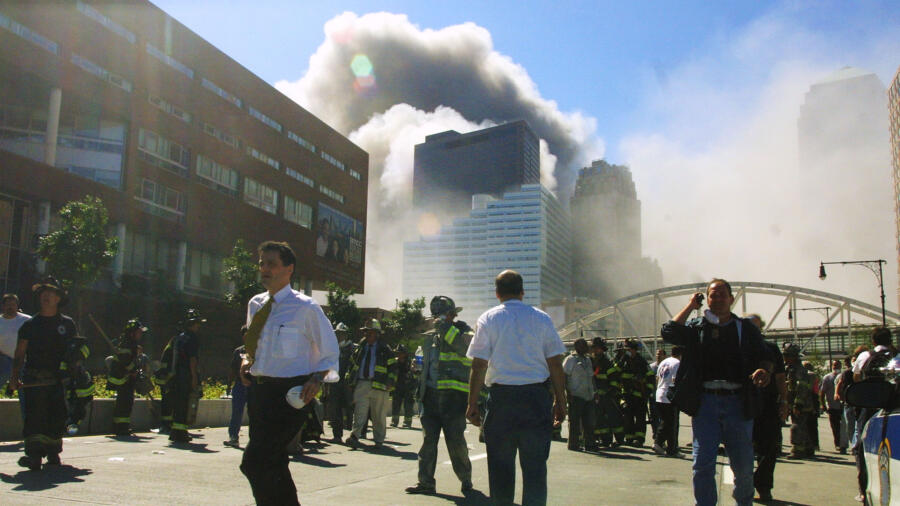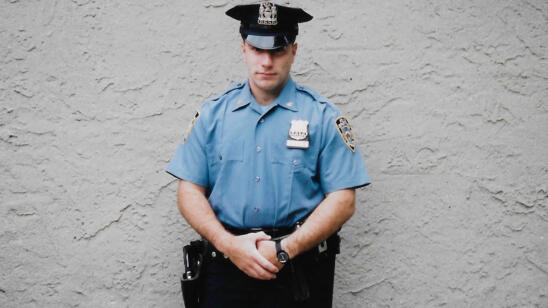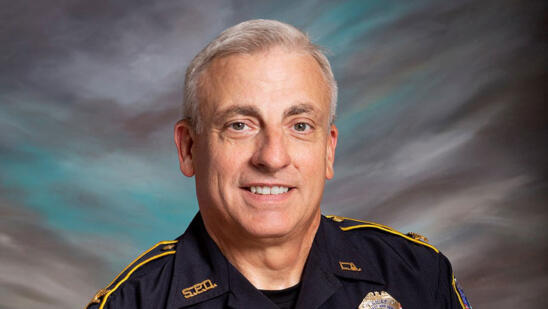On September 11, 2001, every police officer in the NYPD was deployed to work. That included recruits—young men and women who had been sworn in at the police academy in early July but were still several months away from receiving handguns, uniforms and shields. In the words of Assistant Police Chief Edward Delatorre, the Commanding Officer of the Police Academy at the time, “There was really almost nothing in the toolbox. Nothing but their spirit and their courage.”
Captain Roger Sankerdial, now 16 years into his service and working out of the 114th precinct in Astoria, Queens, shares the experience of being deployed on September 11, a mere ten weeks after beginning his police training, with writer Adam Janos.
My mother woke me up.
I was living with my parents at the time in a one-family clapboard in Queens.
She was watching the news. She’s always watching the news. She’s like, “We’re under a terrorist attack.” I’m like, “Ma, what are you talking about?”
I’d been excited, coming into the academy. Right before I’d been working in corporate America as a claims adjuster for an insurance company. There was a downsizing, so I decided to take the buyout package and join the force.
It meant something to me. My family emigrated from Guyana and settled in Lower Manhattan when I was five years old. I was active duty with the Marines for a year, but at my corporate 9 to 5 I wasn’t feeling the same fulfillment. I was making really good money, but I took a 50 percent pay cut because joining the police felt like patriotism, like a continuation of the military.
I was about 10 years older than most of the other recruits. I was even older than my instructor. Some of the other recruits thought the academy was tough and they’d complain. It flowed better for me than for a lot of the others. I loved it. I savored every moment of it.
Academically, I was very hungry. I’m reading about the law and stuff like that. I’d get up, go to the gym and work out, and then I’d go in to the academy, study there, go home and study at night, reading late. I’d be meticulous with my uniform, too: staying up to starch it and press it, making sure it looked sharp. So even all of my free time—the time away from the academy—was directed toward the experience.
The newscaster said, “All first responders have to respond to work immediately.” We had a little phone chain in our company, where we all had a buddy that we would call, so from that I found out we were supposed to report to Floyd Bennett Field in Brooklyn.
I drove down there in my brand new, beautiful BMW—a 323Ci that I’d gotten on my 31st birthday, from corporate America. I’d been getting so much flak from the other guys for driving to the police academy in that thing.
Traffic was frozen—everyone was trying to get out of the city. But then you’d see people caravanning, flying down the road, driving on the shoulders.
Other police.
I didn’t have a real police uniform yet, but I had a traffic vest that said “police” on it so I stuffed that in my windshield. Everyone was trying to get out and I’m with this group of people—tens of cars and growing—trying to gather and go in. My heart’s racing.
When I got to the field it was just chaos. It was starting to get dark and from the field you could see the plume rising and the air was full of haze. They’re gathering us, and when they could fill a bus, they’d send it out. It was a hodgepodge of buses out there: Some were MTA buses, but it seemed like some were just old school buses.
The first post they put me on was 14th street, where we had to lock down any southbound traffic and get everything south of 14th street out. Traffic and personnel—people were not allowed to go down here either. We had to lock it down to free the city of traffic.
That first night I worked all night: 17 hours, maybe. It looked like it was snowing with the dust and soot gathering on our hats, and we’d brush each other off regularly. Whenever I had a break I’d wash my face and put water in my hair, just to get the grey out of it. I coughed a lot.
Every day they’d move us closer to the mound.
One of the photographers who had been documenting our class—Glen Pettit—perished that first night. I still remember meeting him at Queens College, our first day as new recruits. He was stocky, balding a little. I remember he had a real warm smile. We were all terrified, but he was so approachable, so human… As recruits, it was so nice to find someone like that in such an intense situation.
He was never declared dead. He was just deemed missing. He was always missing. But you knew. What really amplified that was the second or third day, when I went down to Ground Zero. We saw that burning heap, and that’s what told us: Nobody’s coming out of that.
We spent weeks on traffic control, allowing the first responders to do their work while we guarded the perimeter.
Within a few days they had us on the West Side Highway at Vesey Street, controlling traffic right there at the perimeter. Every single time a first responder was found, or remains of a first responder was found, an ambulance would be led by a procession of motorcycles and we would salute the ambulance as it went by.
Day to day, the turnaround time between my shifts was on average four hours. Six hours, maximum. Because I lived in the city, I’d drive back home just for the comfort of being in my own house. It was something that was good.
The hardest thing was not knowing what was going on. We were anticipating another attack, but as recruits we didn’t have guns. There would be tiny injects of information they’d feed us every day: There would be a car that had left from Jersey that might have personnel we’re looking for. One time they said a police car had been stolen or an ambulance was stolen from some location. But it would be so broad.
The police academy was considering arming us, but they were hemming and hawing. We were like, “We just got attacked on our own soil here, and we—as recruits—can’t defend ourselves.” We were checking trucks in anticipation of finding bad guys, but what were we going to do if we found them?
Everybody was spread so thin. It could’ve went bad. The whole thing was a baptism by fire.
I ended up winning a graduate scholarship degree on the job to the Naval Postgraduate School where I earned my Masters’ Degree in Homeland Defense and Security. 9/11 gave me that trajectory.
Police officers have a cynical way of doing everything, and they sometimes think very cynically. A lot of younger cops now were only seven or eight on September 11th. They have no idea about it. But sometimes, I try to explain to them: that uniform that you wear, so many people died for it.
When I look at another officer and see that he has that one black breast bar with “WTC” on it… we have a different connection.
We played a support role, but it was fantastic to be able to do that. We helped the city. We helped our brothers and sisters at Ground Zero.
More Cop Stories:
Good Cop, Bad Cop: A Retired Detective on the Best and Worst Cops He Knows
The South Bronx’s 41st Precinct (a.k.a. ‘Fort Apache’) Was a Crazy Place in the ’70s


